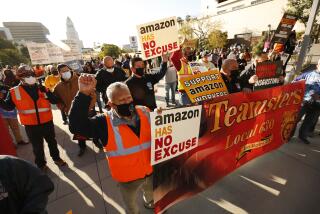Contradiction Fuels Workplace Inequities
- Share via
James Flanigan’s analysis of inconsistencies in the economy (“A Contradictory Economy Driven by Steady Investors,” Jan. 14) cites the breakdown in recent years of contractual relations between employers and workers. He also says such issues “will work themselves out in this adaptable economy.”
Flanigan fails to acknowledge the critical “contradiction” that fuels inequities facing American employees who could once rely on the security of jobs guaranteeing a middle-class standard of living. Consider: Worker productivity is up more than 20% over 20 years; corporate profits are at all-time highs; corporate executives are pocketing huge bonuses and other perks while big firms such as AT&T; are laying off tens of thousands of employees.
These developments negate past trends when the consumer class shared in the wealth as profits went up. Sheer corporate greed--more than “steady investors”--are driving today’s economy.
However, Flanigan is right about one thing: Job insecurity and an overall declining standard of living for American workers are creating new opportunities for the labor movement.
RICARDO F. ICAZA
President, United Food
& Commercial Workers Local 770
and President, Los Angeles County
Federation of Labor, AFL-CIO
Los Angeles
*
Flanigan’s article asks two basic questions: Why do workers still feel so much economic insecurity even though the number of layoffs is down from previous years? And why aren’t investors, who made money, not flocking to the malls?
What is important is not the rate of growth in layoffs, but the cumulative effect of them.
Over the last three years, approximately 1.3 million people have been laid off. Most of those who have found jobs have found them paying far less than what they earned before. The cumulative effect of lower earnings over an ever-widening number of workers is at some point going to hit at retail. Christmas 1995 was that point. With layoff mania continuing into 1996, Santa Claus may be the only person who ends the 1990s with the same job he started with.
As to why investors aren’t flocking to the malls, as your article states, most of this investment is in 401(k) retirement funds. Obviously, whatever money is made from 401(k)s cannot be spent now. It is being saved for the future. But even 401(k)s represent a certain amount of insecurity and lowering of expectational standards. My father’s generation could count on a defined-benefit pension plan plus whatever else he could save. 401(k)s do not equal the security of a defined-benefit plan. The disappearance of defined-benefit plans means a less comfortable future for today’s workers. Combine lower wages with lower retirement benefits and you’ll understand why more and more people are sewing their wallets shut.
As for me, I’m finishing up law school this spring after dealing with my own layoff four years ago. My motivation to go was to find a job in labor law and help workers fight for their rights. Since your article mentioned wrongful termination as a growth industry, maybe I finally got my timing right.
If so, I’ll probably see you in the mall sometime in December of 1997 or 1998.
HOWARD LEVINE
Encino
More to Read
Inside the business of entertainment
The Wide Shot brings you news, analysis and insights on everything from streaming wars to production — and what it all means for the future.
You may occasionally receive promotional content from the Los Angeles Times.










